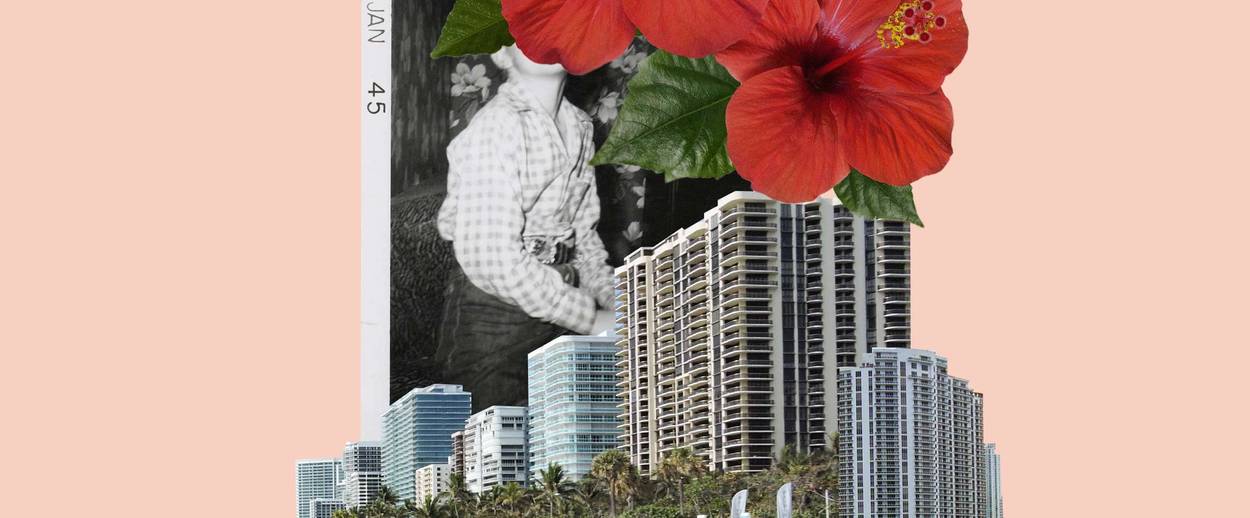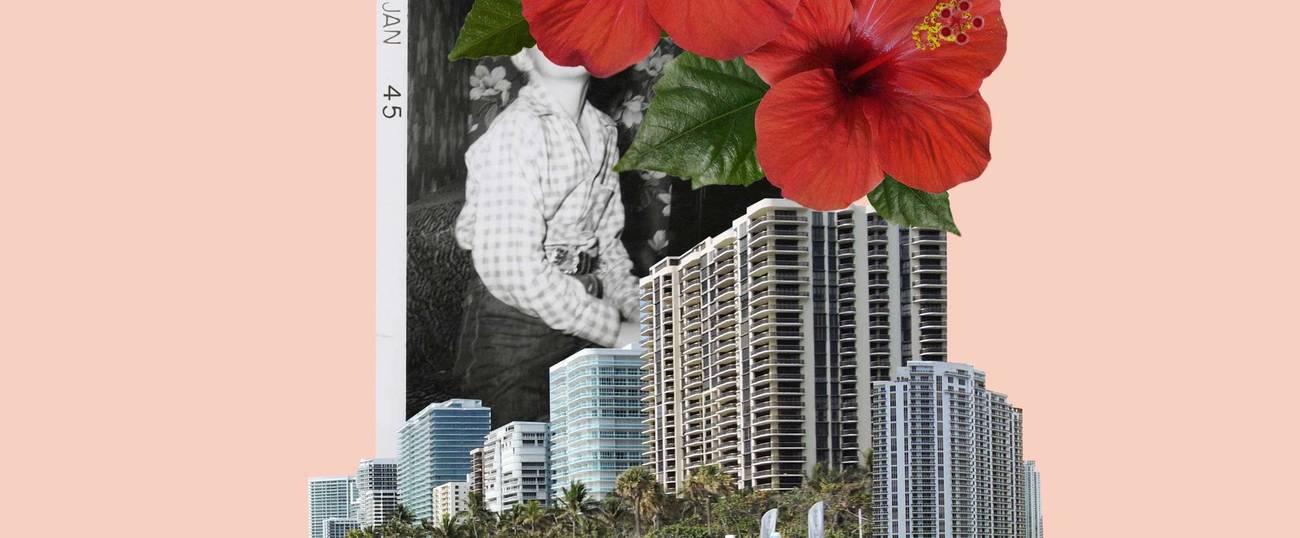Sunshine State
A year ago, I skipped Thanksgiving. I didn’t realize I’d never see my father again.




“Joining us for Turkey Day in Florida?” my father emailed a year ago. “The trip’s on me.”
“I’ll come later in the winter,” I lied.
I was a workaholic, like him. Since fall was my busiest season, I preferred to visit my parents over the summer, when my husband and I had time off from freelancing and teaching. So I begged off, tackling deadlines at home instead of fighting crazy crowds at the airport to go out to overeat with multiple Jewish relatives at 5 p.m.
I was surprised that holiday weekend when my mother texted: “He isn’t eating.”
Jack Shapiro with no appetite was alarming. Days after I’d skipped the family-fest, Dad was rushed to the emergency room in Florida with heart failure. Since he was still strong at 85, I was convinced he’d pull through, the Lion in Winter. Mom didn’t want us all at the hospital at once, so her offspring took turns. My doctor brothers, Brian and Mike, went first, overseeing medical decisions. Next came Eric, the techie who’d wired our clan across states, updating us on Dad’s condition.
“I’ll fly out the second I finish my last class,” I said, sure Dad would recover and I wouldn’t have to rush down South.
Getting home that night, my husband took me in his arms and said, “He’s gone.”
Stunned, I was overcome with guilt: I’d misread everything and screwed up my chance to say goodbye.
Since my parents were snowbirds, Dad was buried in their longtime Michigan town, their rabbi presiding at the funeral. I stood at the open casket, apologizing. I’d never seen a dead body. It scared me. He didn’t look like my Daddy. We’d belonged to a Conservative temple, but I was more cynical than spiritual; no prayers or words of comfort helped. Grief-stricken, I feared I’d failed him: I’d missed his last Thanksgiving, gave him no grandchildren, moved back to what he called “the dirty, terrible city” he escaped. He hated my career and my shrink’s advice to “lead the least secretive life you can.”
“Repression’s the greatest gift of the human intellect,” Dad had countered. “I’ll still pay for law school.”
When I was 45.
Yet over the previous year, my gruff, critical, internist father had mumbled “love you” getting off the phone. He praised my marriage to Charlie, and our moonlighting as professors. Hosting his grandkids in our extra bedroom inspired the email: “You’re a wonderful aunt. Dad.”
“He’s proud of me for the wrong things,” I complained. “For being a wife, teacher, and auntie.”
“Just be happy he’s proud of you,” Charlie said.
Had Dad’s late life approval actually been his clandestine farewell?
Selfishly turning down his last request, I’d rejected him. Now Mom was returning from Michigan to his Sunshine State, without him. “This winter weather’s horrible,” she said. “Your dad was happier in Florida. I’m going back.”
I recalled a poem about how, in mourning, you become what’s missing.
High school sweethearts, they’d wed when she was 20. Once, when Mom was visiting me in Greenwich Village, I’d taken her to a cool new cafe. After two glasses of wine, she’d walked outside and blurted, “I was deflowered upstairs!” Turned out the building was the hotel where they’d spent their wedding night.
They raised their four kids, with their five grandkids, in the Great Lakes State. Yet after Dad’s heart attack at 80, blood thinners made the Midwestern cold unbearable. He retired, sold his practice, and bought a Florida winter residence. The new place was a big deal, since they’d grown up poor. She’d been orphaned by 11. He was a Lower East Side street kid who’d carried blinds up broken steps for his father’s window-shade business. His marriage proposal was, “Just got into med school in the Midwest. Ya coming or not?” The Jewish quotas made it harder so he had to move to get his degree. Going from struggling student to his hospital’s chief of medicine, he relished paying for his offspring’s college and treating us to trips to their winter house. “Family is everything,” he often said, living for the kid-filled trips I’d avoided.
Now, at 83, my pretty redheaded mother was hobbling, needing a hip replacement. “I’m not going back to the hospital where he died,” she said over the phone, three weeks after his funeral.
“Go spend time with her,” Charlie urged.
I decided I’d keep her company in Florida, paying homage to Dad’s Shangri-La, like he’d wanted. Then my last promise to him wouldn’t be a falsehood that haunted me. I needed to undo the lie.
“Freezing temperature’s killing me, too,” I told Mom as an excuse. “Can I come for a few days?”
“Bring your husband. You’re better with him.”
Charlie started calling himself my “support animal.” I wanted to be hers. I’d never seen her so distraught.
“I miss my Jackie. It’s like he’s still in the ICU but coming home soon,” she said. She arranged a companion plot where she would be buried with him. She gave me his sweaters and Charlie his sweatsuit.
“I’ll look like Tony Soprano,” Charlie whispered.
“I’ll wear it,” I said. Though the air was hot and humid, I felt comforted in the extra large black warmup jacket that smelled like Dad. I touched his clothes and books, but couldn’t find him. Unsettled, I was reluctant to leave.
“We could stay longer?” I asked after five days.
“No, you’re hovering. It’s driving me crazy. Go home,” she snapped, the opposite of the warm mama bear I’d called nightly since college.
“What kind of daughter would leave you alone right after losing your husband of 63 years? You can barely walk. He’d tell us to stay,” I yelled, channeling his argumentative personality.
“I don’t need you,” she said. “I only want him.”
“Fine! We’ll leave Wednesday,” I yelled. “I don’t even like Florida.”
“Neither do I,” she screamed back. Was she turning into him, too?
On Wednesday, Brian, my parents’ airport driver, was late. His sharing my brother’s first name felt symbolic. Everything did. “Your flight’s canceled due to bad weather,” read the Delta Air Lines email. The news said the East was a blanket of blizzards.
“First tickets back to New York are Monday,” I reported, nervous we’d outstayed our welcome. “Sorry. I’ll try another airport or airline …”
“Don’t. It’s Storm Jack,” Mom said. “Guess he wants you here with me longer.”
She saw mountains of cross-country snow as proof of his iron will. I longed for my own signal that he’d forgiven me.
For five more days, I barely checked email during Scrabble marathons with Mom. Used to cooking for my carnivorous father, she overfed us Dad’s lamb chops, burgers, and brisket.
The afternoon before we left, I found her lying on their king-size bed, pillows stacked to her left, before glass doors overlooking the honeysuckle and palm trees. “I keep pillows on his side so it seems like he’s still next to me,” she admitted. “Last night one fell. I thought he was reaching for me.”
I snuck in, squeezing between her and the fortress of my father, holding her as we cried. As their firstborn, it seemed primal, the original three now only two, enveloped in his loss. I finally felt his presence. I thought I’d flown here to help her. Yet coming to the house he cherished, his last triumph, was healing me. He’d never cared about dates, festivals, or ceremonies. He just wanted us to be close and take care of each other. I let go of self-recriminations, thankful we’d had such a devoted captain at the helm of our family for so long. Still, it hurt he didn’t know I was visiting belatedly, or how proud I was of him.
Heading to the airport, the driver with my brother’s name said, “Hey, look at that.” I was stunned to see the SUV’s license plate in front of us said: “LuvJack.”
Susan Shapiro, a Manhattan writing professor, is author of several books her family hates like Barbie: Sixty Years of Inspiration, Five Men Who Broke My Heart, The Forgiveness Tour, and her writing guide, The Book Bible. Follow her on Twitter at @Susanshapironet and Instagram at @profsue123.